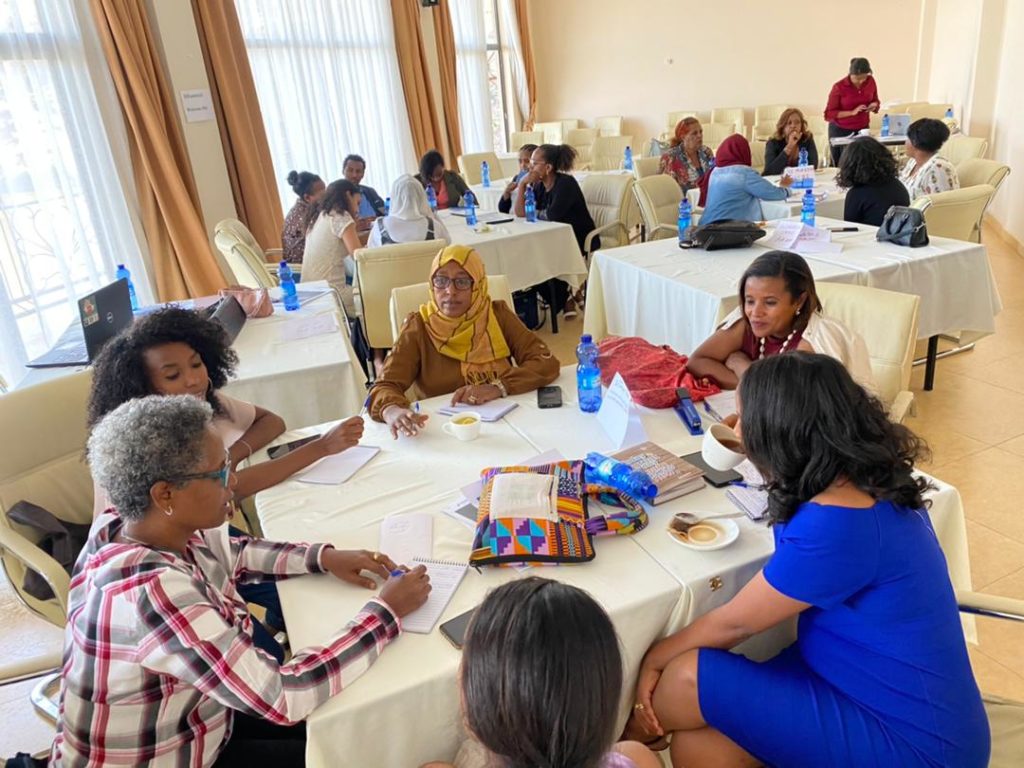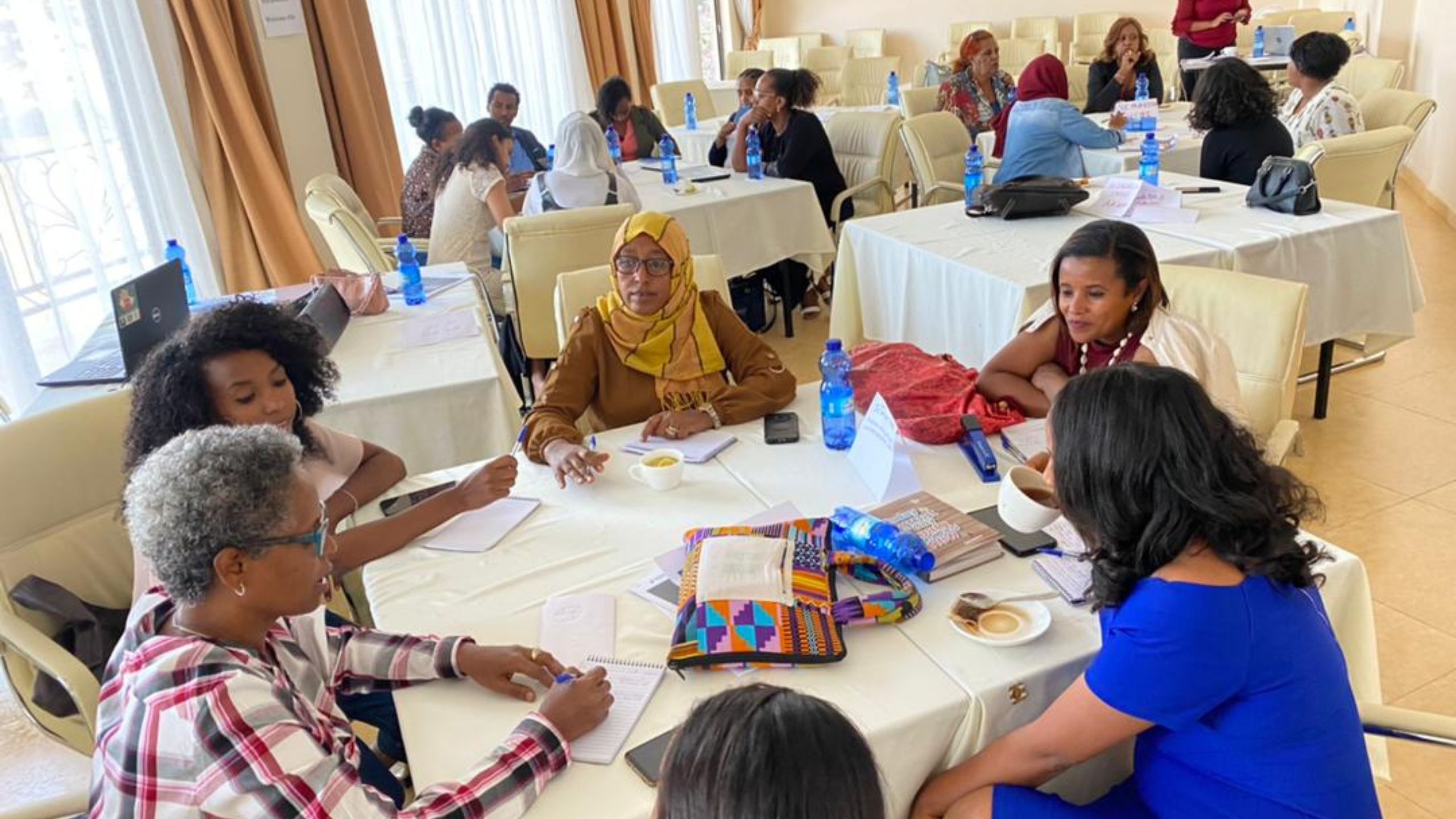Ethiopia: How women are influencing the National Dialogue process
We share insights from our ongoing process support work in Ethiopia, which includes collaboration with women’s rights organisations and networks to increase women’s representation and influence in the National Dialogue process.
Over the past few months, Inclusive Peace has worked closely with an emerging coalition of women’s rights organisations and networks in Ethiopia that all seek to push and shape women’s engagement and influence in the forthcoming National Dialogue process.
Recently, we participated in a two-day workshop organised by TIMRAN, which brought together key networks and organisations such NEWA, EWLA, Setaweet and a number of other women’s organisations working across Ethiopia. At the workshop, Inclusive Peace shared a number of key insights from comparative evidence for discussion around what works and what doesn’t when women’s rights groups and their supporters push for women’s engagement and influence.
Early action boosts sustained engagement and influence
Since the Ethiopian National Dialogue Commission was recently established, there has been a surge of interest from across Ethiopian civil society to better understand and engage in the process. In recent months, different groups of women active in civil society have sought to mobilise and influence the design of the dialogue. For example, they have sought to influence the nominating process for appointing members of the Ethiopian National Dialogue Commission. However, they have found the process frustrating because of the limited window of opportunity given to women’s groups to participate.
Building on their contribution to the process, a broader set of women’s organisations and networks have come together to develop a women’s agenda outlining a set of common positions, proposals, and areas where the coalition intends to contribute and engage in relation to the National Dialogue process. Such early actions are a good start – though good results are not guaranteed and require ongoing efforts.
When looking at comparative examples, early action boosts the prospects of achieving sustained engagement and influence in National Dialogue processes. In Yemen, for example, advocacy efforts by Yemeni women activists and women-led organisations contributed to the adoption of a progressive “inclusion formula”, which guaranteed significant participation of women, as well as youth and other groups, in the different structures of the National Dialogue.
Coalitions are key
Experiences from South Sudan to Cameroon show that the ability to collectively organise and engage on the basis of common positions can be the difference between effective women’s engagement and influence in National Dialogues, and frustrated, fragmented efforts.
During the South Sudan R-ARCSS negotiations, multiple women’s organisations approached the IGAD-led mediation team, only to be turned away and encouraged to organise and present a united front. Fissures within women’s civil society movements can often undermine these efforts, although in many instances, despite these inherent differences, it is possible to work towards a “women’s agenda” or set of common positions and demands. Beyond having a potentially greater influence in the process itself, coalitions are also able to connect to wider segments of society, which can be key in ensuring public awareness and support.
Many emerging coalitions form too early and are too concerned with governance structures and ways of working, which can slow momentum and divert attention away from key questions: What can we do together? How do we organise? While the latter is a critical issue to address, it often becomes clearer once the coalition has more experience of working together and as details about the National Dialogue process emerge. In short, form should follow function when it comes to building an effective coalition.

A workshop led by Timran, a civil society organisation in Ethiopia dedicated to women’s participation in politics and public decision-making. Photo: Alexander Shoebridge (2022)
External support should match the coalition’s needs
There is significant willingness and interest from donors, INGOs, and UN agencies to support women’s engagement in and around National Dialogue processes, such as the one in Ethiopia. However, it is critical that such support is demand-driven. External support and skill-building can be valuable for advancing civil society’s engagement and participation inside and outside of the National Dialogue, but the support is unfortunately often pre-designed by INGOs, UN agencies, and donors rather than responsive to needs within.
Stakeholders in a National Dialogue do not automatically know what kind of support and capacity building they need, as this is often their first experience. While many INGOs or UN agencies have standard training modules – negotiation skill training, issue-based training such as constitution development, conflict analysis, etc. Support often results in a focus on ready-made outputs like training workshops and consultations that might not be needed at this stage of the process and can hinder the effectiveness of actors engaged inside and outside the National Dialogue, as these actors have less time and focus on the most relevant strategies and needs.
Ethiopian civil society, particularly civil society engagement on peacebuilding issues such as national dialogue, remains nascent and emergent. A needs-based and humble approach in which donors and external actors (such as INGOs and UN agencies) should engage with civil society in the coming period will be critical in shaping the future trajectory of Ethiopia’s civil society.
There have been a series of global commitments in recent years where donors have agreed to pursue more flexible and adaptive funding and direct a greater proportion of funding to local actors. And it is much needed. Globally, 0.2 percent of bilateral funding to conflict-affected contexts is received by women’s rights organisations and almost half of youth-led organisations operate with an annual budget of less than USD 5,000, most of which is mobilised through local donations (GPPAC, 2020). Most bilateral and multilateral donors commit to the Grand Bargain on Humanitarian Aid, which set a target of 25 percent of funding allocated to national actors.
In Ethiopia, there is now an opportunity for donors to use their support to the National Dialogue to translate these commitments into practice. There is also an opportunity for local actors to remind donors about these commitments and communicate to INGOs and their donors how the support should be shaped to respond to women’s coalition needs.
Moving forward
For Inclusive Peace, it is a real privilege to continue to accompany and support the work of Ethiopian women’s rights organisations and activists as they look to engage in and influence the National Dialogue process. The coalition is now moving ahead with advocating for the common Women’s Agenda, which sets out proposals for how the National Dialogue can take shape, while also presenting a set of areas where the coalition themselves see their added value and contribution.
It remains to be seen to what extent these ideas will be taken on board, but the energy and determination women activists have shown coming together augurs well for the future, their leadership and influence both in and around the National Dialogue and beyond.

